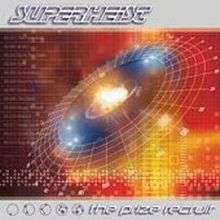The Prize Recruit
| The Prize Recruit | ||||||||||
|---|---|---|---|---|---|---|---|---|---|---|
 | ||||||||||
| Studio album by Superheist | ||||||||||
| Released | 15 April 2001 | |||||||||
| Recorded |
2001 Sing Sing Studios, Melbourne | |||||||||
| Genre | Nu metal | |||||||||
| Length | 47:09 | |||||||||
| Label | Pivotal/Shock | |||||||||
| Producer | Kalju Tonuma | |||||||||
| Superheist chronology | ||||||||||
| ||||||||||
The Prize Recruit is the debut full-length album from Australian nu metal band, Superheist. It was recorded at Sing Sing Studios in Melbourne by Superheist and producer Kalju Tonuma and released on 15 April 2001. It peaked at No. 12 on the ARIA Albums Chart. At the ARIA Music Awards of 2001 Tonuma was nominated for Producer of the Year and Engineer of the Year for the album.
Background
In April 2001 Superheist's first full-length studio album, The Prize Recruit, was released by Shock Records, it peaked at No. 12 on the ARIA Albums Chart.[1][2] A reviewer for Rolling Stone described it as "what the new heavy breed should sound like".[2] Theprp.com website's wookubus felt the band "continue to evolve and each facet of their aural expression has been stepped up a notch, from the more encompassing use of programming to the stronger vocal variation and sleeker song structures" with the album generally "a very lush and colorful ride that the listener can literally slip right through, with little to no snags. Sure there are a few moments where things become a little too overtly radio friendly or sound a bit commercially focused, but with the bulk of the material included representing an eclectic blend of energetic modern metal crunch, such things are easy enough to overlook".[3]
The Prize Recruit was produced by Kalju Tonuma (Boom Crash Opera, The Mavis's, Hunters & Collectors)[4] and at the ARIA Music Awards of 2001 he was nominated for Producer of the Year and Engineer of the Year for the album.[5] In March of the following year, a Shock Records representative claimed that the label had spent $250–300,000 on the album and despite sales approaching 35,000 units they were still short of covering their expenses.[6] The second single from the album, "Bullet", had appeared in March 2001, which peaked at No. 45.[7][1] The album's third single, "Step Back/Slide" (July), had less chart success although it reached the top 100.[8]
Track listing
- AUS CD PIVOTAL0001
All music composed by Superheist.
| No. | Title | Length |
|---|---|---|
| 1. | "The Fight Back" | 3:15 |
| 2. | "Bullet" | 4:10 |
| 3. | "Burnt Out Souls" | 3:27 |
| 4. | "Slide" | 4:47 |
| 5. | "Deliverance" | 4:10 |
| 6. | "Uncanny Decadence" | 2:48 |
| 7. | "Old Again [Eurotrash]" | 3:45 |
| 8. | "The Ghost" | 4:27 |
| 9. | "Happy Wasted" | 3:06 |
| 10. | "Unlearn" | 2:53 |
| 11. | "Down South" | 2:57 |
| 12. | "Crank the System" | 3:44 |
| 13. | "[Hidden Silent Track]" | 0:04 |
| 14. | "Step Back" | 3:35 |
| Total length: | 47:09 | |
Industry Promo featuring the album with a slightly different edit & track listing
- AUS Advance Promo CD SUPERPROMO
- "The Fight Back" – 3:49
- "Bullet" – 4:10
- "Burnt Out Souls" – 3:27
- "Slide" – 4:47
- "Deliverance" – 4:10
- "Uncanny Decadence" – 2:48
- "Old Again [Eurotrash]" – 3:44
- "The Ghost" – 4:27
- "Happy Wasted" – 3:06
- "Unlearn" – 2:53
- "Down South" – 2:57
- "Crank The System" – 3:47
- "Step Back" – 3:34
Personnel
- Superheist
- Rod McLeod – lead vocals
- Richard William "D W" Norton – lead guitar, backing vocals
- Sean Pentecost – drums
- Fetah Sabawi – keyboards
- Drew Dedman – bass guitar
- Production work
- Kalju Tonuma – producer, engineer
- Jimi Maroudas, Nick Cervonaro, Richard Stolz – assistant engineer
- Stephen Marcussen – mastering
- Rick Will – mixing
References
- 1 2 Hung, Steffen. "Discography Superheist". Australian Charts Portal. Hung Medien (Steffen Hung). Retrieved 4 September 2014.
- 1 2 "The ARIA Report" (PDF). Australian Recording Industry Association (ARIA). 23 April 2001. pp. 2, 4–5, 7, 10–12, 16. Archived from the original (PDF) on 21 February 2002. Retrieved 6 September 2014.
- ↑ wookubus. "Heavier Than Your Mom". The PRP (Pimp Rock Palace). Retrieved 6 September 2014.
- ↑ Holmgren, Magnus. "Superheist". passagen.se. Australian Rock Database (Magnus Holmgren). Archived from the original on 22 April 2012. Retrieved 4 September 2014.
- ↑ "Winners By Year – 27th ARIA Awards 2013 – Search Results 'Superheist'". Australian Recording Industry Association (ARIA). Retrieved 6 September 2014.
- ↑ Ellingsen, Peter; Donovan, Patrick (18 March 2002). "Playing to a Fading Beat". The Age. Fairfax Media. Retrieved 6 September 2014.
- ↑ Australian Music Online, Pivotal associated singles:
- "Crank the System" :– "Releases :: 'Crank the System'". Australian Music Online. Archived from the original on 22 November 2005. Retrieved 6 September 2014.
- "Bullet" :– "Releases :: 'Bullet'". Australian Music Online. Archived from the original on 22 November 2005. Retrieved 6 September 2014.
- "7 Years" :– "Releases :: '7 Years'". Australian Music Online. Archived from the original on 22 November 2005. Retrieved 6 September 2014.
- ↑ "The ARIA Report" (PDF). Australian Recording Industry Association (ARIA). 16 July 2001. p. 4. Archived from the original (PDF) on 21 February 2002. Retrieved 6 September 2014.
External links
- The Prize Recruit at AllMusic
- The Prize Recruit at Discogs